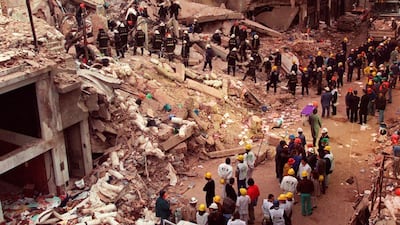A US Senate resolution has increased the pressure on the Argentine government to press on with its investigation and apprehend the suspects of the 1994 bombing of the Argentine Israelite Mutual Association (AMIA) Jewish Community Centre in Buenos Aires, which killed 85 people and wounded more than 300 others.
The Hezbollah group and Iranian officials are suspected to be behind the attack, the deadliest in Argentina’s history, though both have denied any responsibility.
The resolution comes as United States on Friday imposed financial sanctions on Salman Raouf Salman, a Hezbollah leader suspected of masterminding the attack.
The US Treasury sanctioned Salman for acting for or on behalf of Hezbollah, while the State Department is offering a $7 million reward for information on his location.
Salman "coordinated a devastating attack in Buenos Aires, Argentina against the largest Jewish centre in South America 25 years ago and has directed terrorist operations in the Western Hemisphere for Hezbollah ever since," said Sigal Mandelker, the US Treasury's Under Secretary for Terrorism and Financial Intelligence.
Argentina is home to the largest Jewish community in Latin America and is the sixth largest in the world outside Israel.
On Thursday, on the 25th anniversary of the bombing, Argentina became the first Latin American country to deem Hezbollah a terrorist organisation, throwing the investigation into the attack, which is still ongoing, back into the spotlight.
The five former Iranian officials who are suspected to be behind the attack are able to travel internationally without impunity, the Senate resolution said.
“For 25 years, the investigation into the bombing has been stymied by international inaction, political interference, investigative misconduct and allegations of cover ups, including the removal of the federal judge in charge of the case in 2005 for “serious” irregularities in his handling of the case,” the resolution read.
The resolution made reference to Argentine special prosecutor Alberto Nisman, who was handling the investigation. He accused Cristina Elisabet Fernández de Kirchner, the President of Argentina at the time, of colluding with the Iranian government to cover up the terrorist attack.
Nisman was found dead as a result of a gunshot wound in his head in his Buenos Aires apartment in January 2015, the day before he was due present his findings to a commission of the Argentine National Congress. In a trash can at the scene, police found a draft of a legal document, written by Nisman but never executed, clearing the way for Kirchner's arrest.
"Argentina may have designated Hezbollah but it remains clear it was backed by and masterminded by Iran," Toby Dershowitz, a senior vice president at the Foundation for Defence of Democracies told The National. "Iran is a member of Interpol and yet it continues to refuse to hand over the five former Iranian officials who have red notices akin to international arrest warrants in connection with their role in the AMIA bombing."
“Our research shows that these red notice holders, along with a couple of others that have international arrest warrants by Argentina, have travelled to 20 countries with impunity,” added Ms Dershowitz.
“My hope would be that this new focus on Argentina on deadliest bombing also leads to countries co-operating with Interpol and Argentina in apprehending those individuals with the red notices.”
She added that Argentinian officials are having conversations with officials from other Latin American countries about Hezbollah threat levels, which have been known to operate in the tri-border area of Argentina, Brazil and Paraguay.

